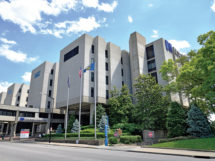
Instead of launching a major construction project, Trover Health Care in Madisonville and Pattie A. Clay Regional Medical Center in Richmond found a more cost-effective way to get bigger. Both hospitals are merging with Kentucky industry giant Baptist Healthcare System Inc.
Pattie A. Clay completed its transition earlier this month, with the larger Trover system deal expected to conclude later this fall.
In addition to giving both regional hospitals greater access to capital and a position of strength in the face of healthcare reform, the mergers will increase Baptist Health’s presence in Kentucky’s healthcare market and give it a reach throughout the commonwealth rivaled only by KentuckyOne Health.
Andy Sears, Baptist Health vice president for planning and development, describes the expected partnership with Trover and Pattie A. Clay as a true asset merger. Both healthcare providers are becoming full-fledged members of the Baptist system, sharing in its considerable capital resources, professional infrastructure and ability to flourish in the changing U.S. healthcare landscape.
“It’s a fact that smaller companies within the healthcare industry are, or will be, under tremendous pressure to consolidate,” Sears said.
As they assess their best strategies for multiple factors creating change in care delivery the next few years – consumer demand for advanced technology, development and implementation of an integrated electronic medical records system, speculation and worry about the impact of the federal Patient Protection and Affordable Care Act – many smaller systems are looking at consolidation as the best way to thrive going forward.
“Larger systems have a better opportunity at surviving in the reform of the industry that we know is coming,” Sears said.
The Trover Health System in Madisonville has operated for over a half century as a successful independent regional healthcare provider. It has built a distinctive reputation making good on its mission to provide care to underserved areas of Western Kentucky.
E. Berton Whitaker, CEO and president of the Trover Health System, said the board of trustees and medical staff in Madisonville spent several years debating whether to stay independent or to align with a larger organization with greater resources.
“We have a long-standing history as an independent, not-for-profit healthcare provider, and there was plenty of sentiment to retain that identity,” Whitaker said. “We challenged ourselves to weigh the gains we would make remaining independent against our potential progress as part of a larger organization.”
[pullquote_left]“In our (Baptist’s) opinion, the way the economy is moving, the way the healthcare industry is going, larger systems are simply going to be better poised to survive. But we all are facing the same challenges that all hospitals and healthcare systems are going to face – discovering the ways to reduce costs and improve quality at the same time. It’s going to make for some interesting developments in the coming decade.” Andy Sears, Baptist Health vice president for planning and development[/pullquote_left]
Among factors board members weighed was access to capital, access to corporate support services, and assistance in the development of new models of payment in particular. There were other issues, but these three were particularly crucial, he said.
“We did the math. It became clear that in the long term we were not producing enough to be on our own. … It just made sense to be part of a larger healthcare network so that we can be prepared to purchase smarter, plan smarter and ultimately grow where we might struggle alone,” Whitaker said.
In early 2011, Trover announced it would seek out a partner. Last November, the trustees and medical staff agreed to enter exclusive negotiations with Louisville-based Baptist Health system.
“We were in a good position no matter whom we went with. The finalists (Baptist, Owensboro Medical Health System, and Lifepoint Health System) are very respected and responsible organizations,” Whitaker said. “The board and staff just felt that the greatest amount of synergy was between Trover and Baptist.”
From a practical standpoint, Trover and Baptist had purchased the same electronic medical record system, so there already was some infrastructural compatibility.
“Joining Baptist allows us to become part of a multi-hospital network with gross revenues vastly greater than our own. … We have access to more complex technology than we could ever do on our own … and access to Baptist’s corporate infrastructure,” Whitaker said. “While that may mean we have to standardize some aspects of our administrative operations, we also get the benefit of a marketing department that, independently, we just could not afford.”
The affiliation will enhance physician recruitment and provide access to specialists who will improve Trover services, he said.
Baptist Health also will benefit from association with the Trover Health System.
“There was a gap in the western part of the state where we did not have a physical presence, and Trover helps us fill that gap,” Sears said.
Baptist owns Western Baptist Hospital in Paducah and operates a management agreement with Hardin Memorial Hospital in Elizabethtown. Trover’s geographic location between those holdings will make the Baptist system a dominant presence all along the Western Kentucky Parkway.
“We have hospitals serving both the eastern and far western sections of the state as well as being well placed in Kentucky’s two largest metropolitan areas. But there are pockets of the state we don’t serve particularly well. So in looking at our geography, Trover meets our needs very well,” Sears said.
Pattie A. Clay already was operating under a management agreement with Baptist, one step away from being completely within the system’s fold. As management provider for the regional hospital for several years, Baptist had thrived within that relationship.
But the Madison County hospital was under pressure to make substantial changes to its healthcare delivery system not only because of concerns about diminishing reimbursement under federal legislation but also from the intensity of competition with Lexington area hospitals. Unlike the Trover, Pattie A. Clay is in close proximity to one of the Baptist Health’s cornerstone properties – Central Baptist Hospital. It also is only 63 miles from Baptist Regional Hospital in Corbin.
The same questions that occupied Trover’s board were on the minds of Pattie A. Clay’s trustees. The board drew the same conclusion: affiliation with a larger network. How full affiliation with Baptist will affect services at the Richmond facility is still being explored.
“A lot of the conversation we have had with Lexington, Corbin and Richmond is how they can be complementary to each other. With regard to Pattie A. Clay, we have always attempted to provide care where it makes the most sense to the community, recruiting the right medical staff and providing the right service mix,” Sears said. “Central Baptist offers an array of secondary and tertiary care services that Pattie A Clay does not, and likely won’t, provide. But the community needs access to a high-quality range of primary care and secondary care services that this regional hospital should provide.”
Any decision on building or renovation projects won’t come until after a formal strategic planning process takes place. Immediate visible changes will largely be cosmetic – sign changes and use of Baptist corporate symbols.
Change is coming, but it will arrive in a very carefully planned and structured way.
“In our (Baptist’s) opinion, the way the economy is moving, the way the healthcare industry is going, larger systems are simply going to be better poised to survive. But we all are facing the same challenges that all hospitals and healthcare systems are going to face – discovering the ways to reduce costs and improve quality at the same time,” Sears said. “It’s going to make for some interesting developments in the coming decade.”
Josh Shepherd is a correspondent for The Lane Report. He can be reached at [email protected].




















Add Comment